Blank Family Foundation Awards $100,000 to GaFCP to Support Relief Efforts in Southwest Georgia Counties Impacted by COVID-19
Print This Post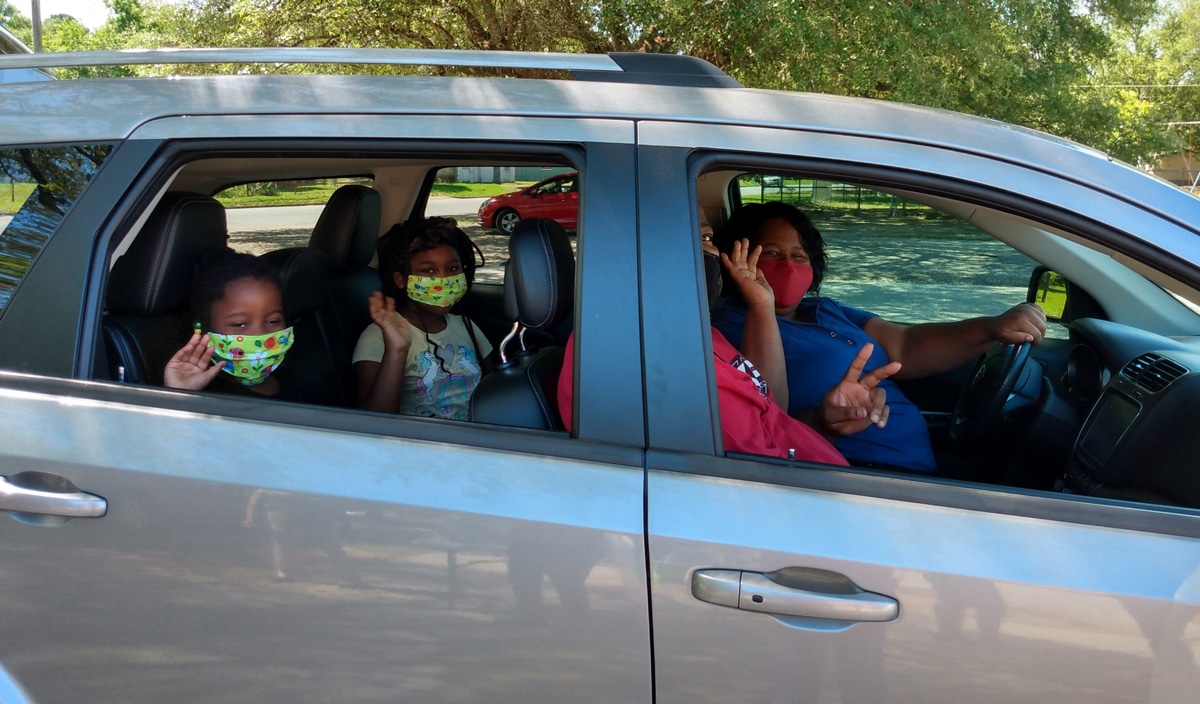
Across the state, hard-working Georgians’ struggles to become or remain healthy and self-sufficient have become more intensified because of the COVID-19 pandemic. This is especially true in southwest Georgia, one of the hardest-hit areas in the state—and in the country.
Data released by the Georgia Department of Public Health in April showed that out of the top 20 counties in Georgia with the highest rates for COVID-19 cases per 100,000 people, the majority were in southwest Georgia. And of the 20 counties in the U.S. with the most deaths per capita from COVID-19 in April, five were in southwest Georgia.
“Southwest Georgia is a major hotspot for COVID-19,” said Patsy Shirley, Lee County Family Connection coordinator. “We have no clear understanding of how long this pandemic will last and the financial toil it will truly take on our country—much less our small corner of the world here in rural southwest Georgia.”
The rural counties with the highest death rates often have no doctors or hospitals, and lack internet access—further limiting residents’ ability to seek care.
“Case management for the needs of families who tested positive for COVID-19 here has been minimal due to a stressed system that’s in a state of emergency,” said Crisp County Community Council Executive Director Sherry Evans. “These families are hurting.”
To meet the immediate needs of this region, the Arthur M. Blank Family Foundation has awarded $100,000 in grant funding to Georgia Family Connection Partnership to support the relief efforts of 11 counties.
“Our Collaboratives in these 11 rural counties were already in a position to lead relief efforts in their communities because they’ve fostered safe, meaningful connections—especially for our most vulnerable neighbors,” said GaFCP Executive Director Gaye Smith. “We’re fortunate to support our statewide network to do this work and to adapt to these unprecedented circumstances, because we were poised and ready to help our Collaboratives respond to their communities’ needs. We’ve enjoyed a long dynamic partnership with the Blank Foundation, and we appreciate this opportunity to navigate this pandemic together.”
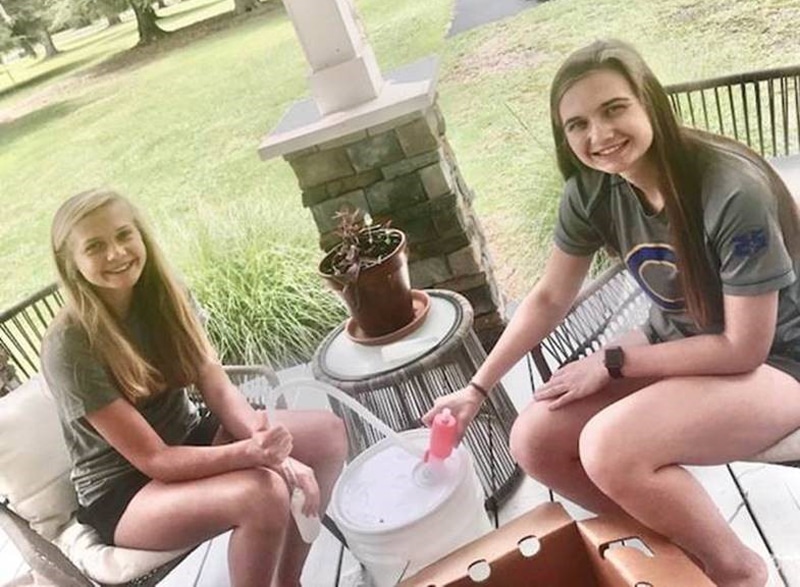
Georgia Family Connection Collaboratives in Calhoun, Colquitt, Crisp, Dougherty, Early, Lee, Mitchell, Randolph, Sumter, Terrell, and Worth counties are working with partners to provide children and families with basic needs—including food, toiletries, and sanitary and cleaning supplies—as well as neighborhood outreach to promote healthy behaviors and access to domestic abuse services.
“We have a high poverty population with so many people who were already vulnerable—and now citizens have lost jobs in record numbers, face food insecurity, and lack the resources required to meet basic needs and sustain their families,” said Randolph County Family Connection Executive Director Kuanita Murphy. “Being able to move forward with relief projects during this crucial time helps us meet basic needs and enhance recovery efforts.”
Janet Sheldon, executive director of Colquitt County Family Connection, agrees. “The resources have shrunk and the needs have swelled,” she said. “This funding supports our work in a way traditional sources can’t, due to the coronavirus shutting everything down. It means that 1,000 families in our county can be helped from going hungry.”
Calhoun County Residents Receive Grocery Vouchers
Calhoun County Family Connection distributed 50 grocery vouchers to residents who have lost employment, wages, or income due to the COVID-19 crisis. For the past 17 years, the Collaborative has distributed grocery vouchers to senior citizens. “The relief of not having to purchase food will free up funds to purchase prescribed medicine or other needs like rent or utilities,” said Alicia Varnum, Calhoun County Family Connection coordinator, who worked with key community leaders and elected officials to compile a list of voucher recipients. “Our Collaborative focuses on those who need a hand up. The current circumstances have increased that number and we want to help.”
Colquitt County Food Bank Fields Increased Food Requests
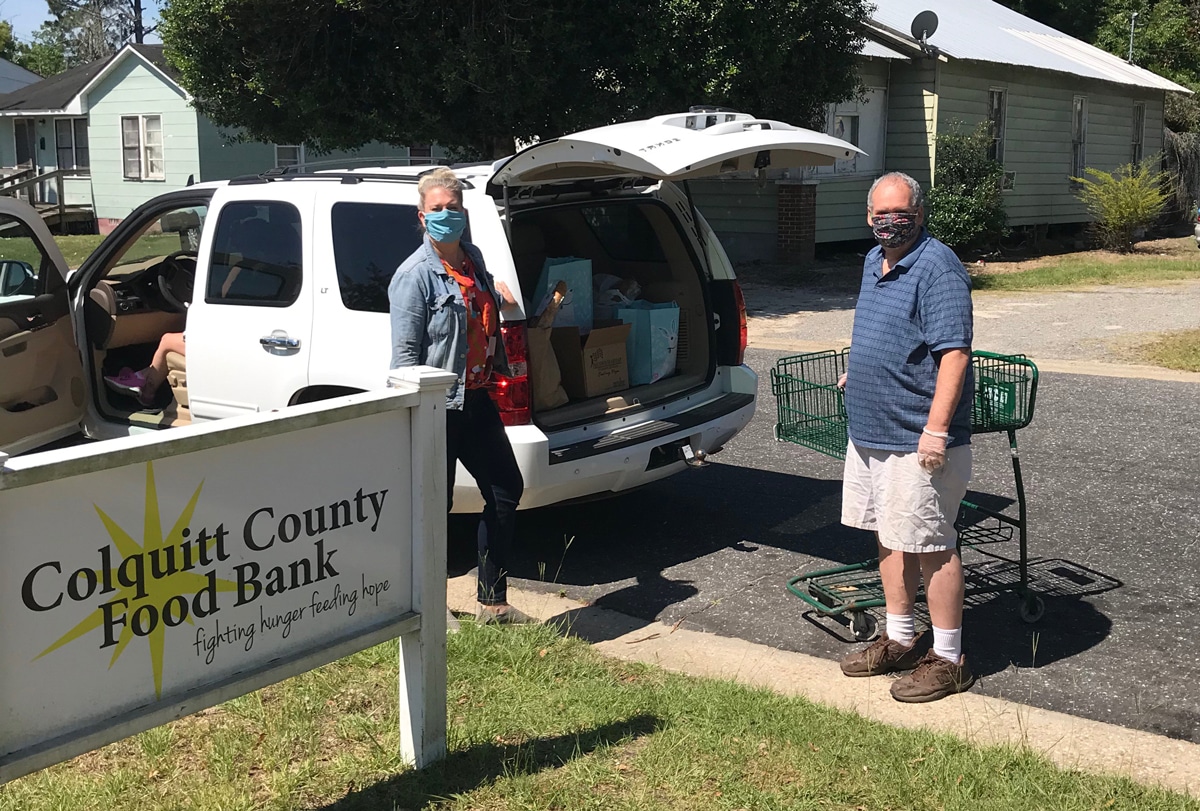
In Colquitt County, 100 percent of children are eligible for free school breakfast and lunch. This means that when school is out, many children go hungry. “There were increasing signs of distress even before COVID-19 destroyed the way of life and livelihood of many in our community,” said Sheldon. Colquitt County Food Bank saw a 40-percent increase in food requests from the first quarters of 2019 to 2020. The food bank supports the school system, senior center, Serenity House shelter for survivors of domestic violence, and Crossroads Gospel Rescue Mission, among others.
Crisp County Families Access Much-Needed Telehealth Services
Crisp County Community Council is working with health care partners to address food access and medical needs for some of the county’s most vulnerable citizens. “COVID-19 patients, mental health clients, and their families are heavily burdened by physical and mental illness, as well as emotional difficulties,” said Evans. “Families have experienced unexpected trauma, grief, and expenses that have impacted their quality of life.” In Crisp County, 50 percent of children live in poverty and 50 percent live in single-parent families. In-school, on-site, and home visiting therapeutical and mental health services for residents—including victims of child abuse and neglect, domestic violence, or sexual assault—were interrupted by the state of emergency. The Council is able to provide much-needed telehealth services while addressing basic needs like food, toiletries, and cleaning supplies.
Care Packages Reach Families in Dougherty County
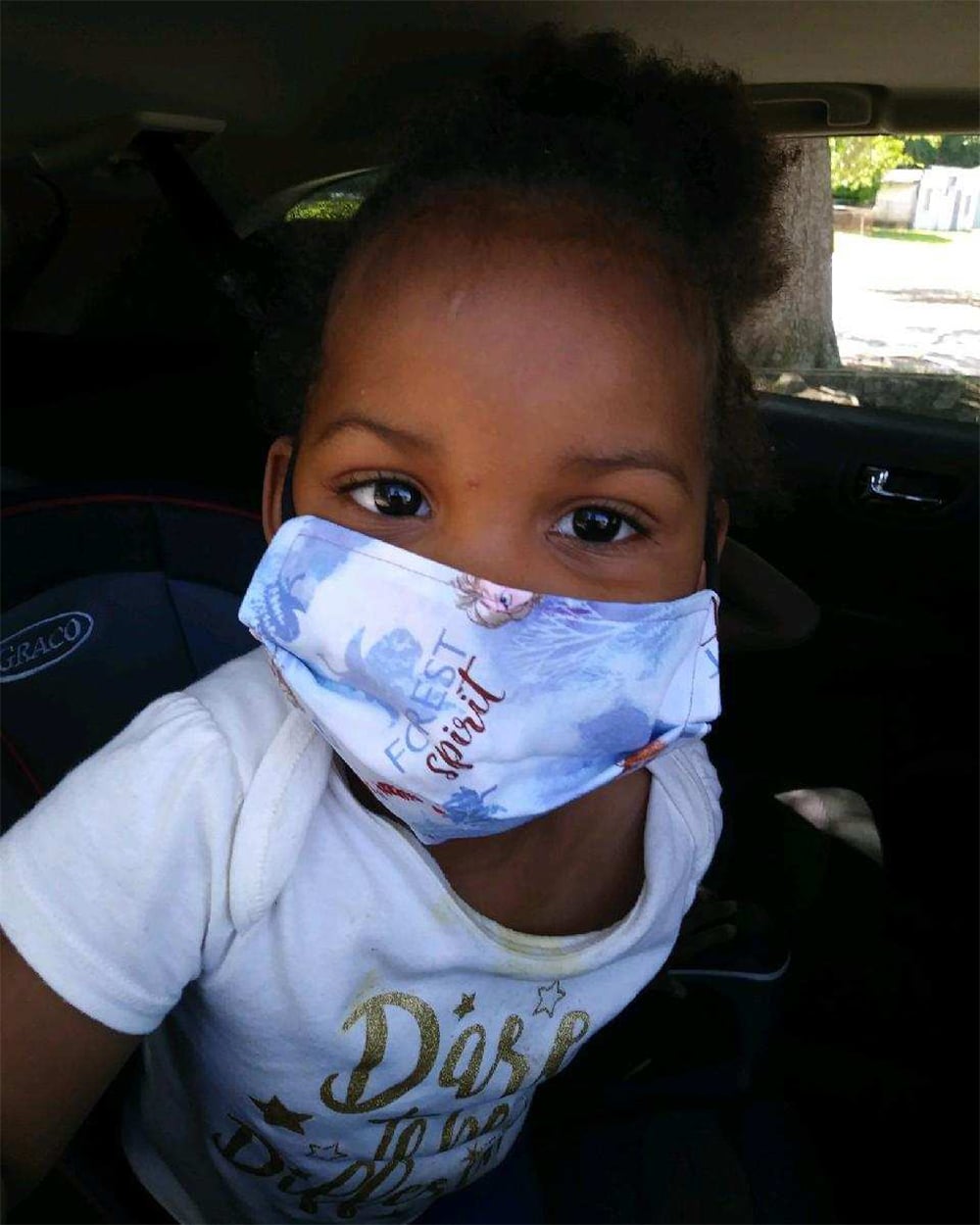
Dougherty County Family Literacy Connection is focused on meeting the needs of children and families by reaching out through virtual home visits, phone calls, and Facebook chats. The Collaborative is helping to distribute care packages with diapers, wipes, cleaning supplies, and children’s activities to families. The Collaborative is also assisting partner agencies with food distribution and teaming up with Network of Trust to provide snacks and books for school-age children of hospital personnel. “Food shortages are rampant, and agencies are working together to serve as many people as possible,” said Sandy Bamford, Family Literacy Connection coordinator.
Workers Affected by COVID-19 Receive Support in Early County
Early County Family Connection is supporting employees who have been laid off or had hours reduced due to the pandemic, working with the county’s five largest employers and the Chamber of Commerce to identify 35 small businesses with layoffs and develop a list of 80 families to receive grocery vouchers. “We are trying our best to ensure that there is collaboration and no duplication of services,” said Gwen Houston, Early County Family Connection coordinator. “Families are struggling to pay rent or utilities and we’re developing a process to support them financially.”
Lee County Addresses Food Insecurity for 375 Families
The day school closures were announced in March, Lee County Family Connection leapt into planning mode. “We knew food insecurity would quickly become a major issue,” said Coordinator Patsy Shirley. Nearly half of the county’s students rely on the school’s free breakfast and lunch as well as Backpack Blessings weekend meals provided to elementary school students for the last 10 years through a partnership between Lee County Family Connection, The Vine of Leesburg food bank, and The Kiwanis Club of Lee County. The Blank Foundation funding allows the Collaborative to cover six weeks of their 20-week commitment to provide food to 375 families. “Our partners bring their own unique contribution to this collaborative project,” said Shirley. “Our Collaborative is catalyzing all the moving parts to ensure that there’s funding secured, food prepared, volunteers to manage the distribution—and that we’re following safety guidelines.”
Mitchell County Residents Receive Assistance with Rent, Utilities, and Groceries
Mitchell County Children and Youth is working to fulfill increased requests for assistance with rent, utilities, and groceries for families who have lost jobs or hours due to COVID-19—while also supplementing what partners are already doing to help families in need. “Working together with our partners is crucial, so we can identify these families together and figure out what their most important needs are,” said Jessica Jennings, Collaborative executive director.
Randolph County Focuses Relief Efforts on Most Vulnerable Citizens
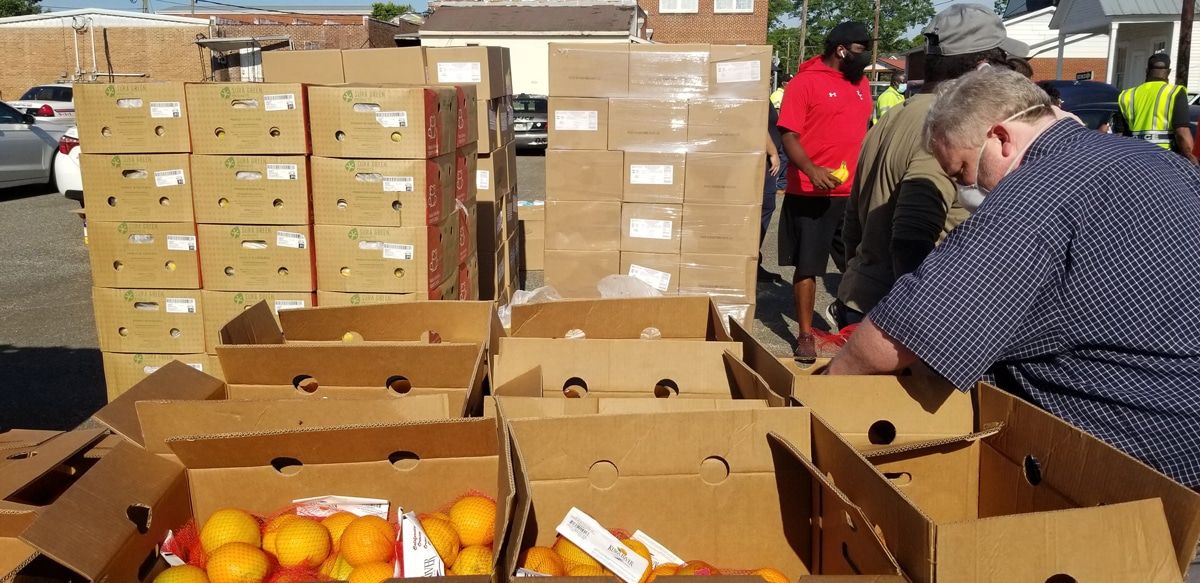
Randolph County Family Connection developed three initiatives to aid those who need immediate assistance: providing 700 families with food boxes and essential household items, supporting 100 quarantined senior citizens and disabled residents by providing food boxes and cases of water, and ensuring that 70 mothers of children ages birth – 2 have formula, diapers, and wipes. “Once readily available resources are closed because of the pandemic, and our local healthcare system has been overwhelmed,” said Murphy. “During this crucial time, these projects are enhancing our recovery efforts.”
600 Children Receive Meals and Hygiene Items in Sumter County
Sumter County Family Connection is expanding services to provide meals and hygiene items to reach 600 children each week, specifically those residing in low-income housing in the most rural outlying areas of the county. “Our work includes promoting economic self-sufficiency in Sumter County,” said Jessica Sinclair, Collaborative coordinator. “During this COVID-19 crisis, households with children are experiencing an increased demand on food supplies. Assisting with lunch for children provides relief to residents who would otherwise not have resources to provide extra meals for the household.”
Terrell County Families Receive Healthy Food and Academic Support
Terrell County Family Connection is providing healthy food to families and working closely with school partners to address academic and technology needs. The Collaborative is distributing gift cards to families, providing meals to nursing home staff and first responders, and providing arts and crafts supplies to the local nursing home and rehabilitation center. “The new funds enable us to provide additional food distribution, educational support to students, and technical and academic support to Terrell County School System, Terrell County Head Start, Parent Academy, and Positive Youth Direction Center,” said Tonia Jacobs, Collaborative coordinator.
Families and Seniors Receive Emergency Food Boxes in Worth County
Sylvester-Worth County Family Connection Partnership is providing 120 emergency food boxes to families and senior citizens identified by local agencies and hosting a community food box drive-through for 250 families. “We also recognized a need for domestic violence and child abuse awareness, and we’re providing informational brochures in every food box,” said Lisa Dylinski, Collaborative director.
Contact:
Krystin Dean
GaFCP Communications Specialist
706-897-4711
krystin@gafcp.org
Follow us on Twitter: @gafcpnews
Connect with us on Facebook.
Georgia Family Connection Partnership (GaFCP) is a public-private partnership created by the State of Georgia and investors from the private sector to assist communities in addressing the serious challenges facing children and families. GaFCP also serves as a resource to state agencies across Georgia that work to improve the conditions of children and families. Georgia KIDS COUNT provides policymakers and citizens with current data they need to make informed decisions regarding priorities, services, and resources that impact Georgia’s children, youth, families, and communities.
